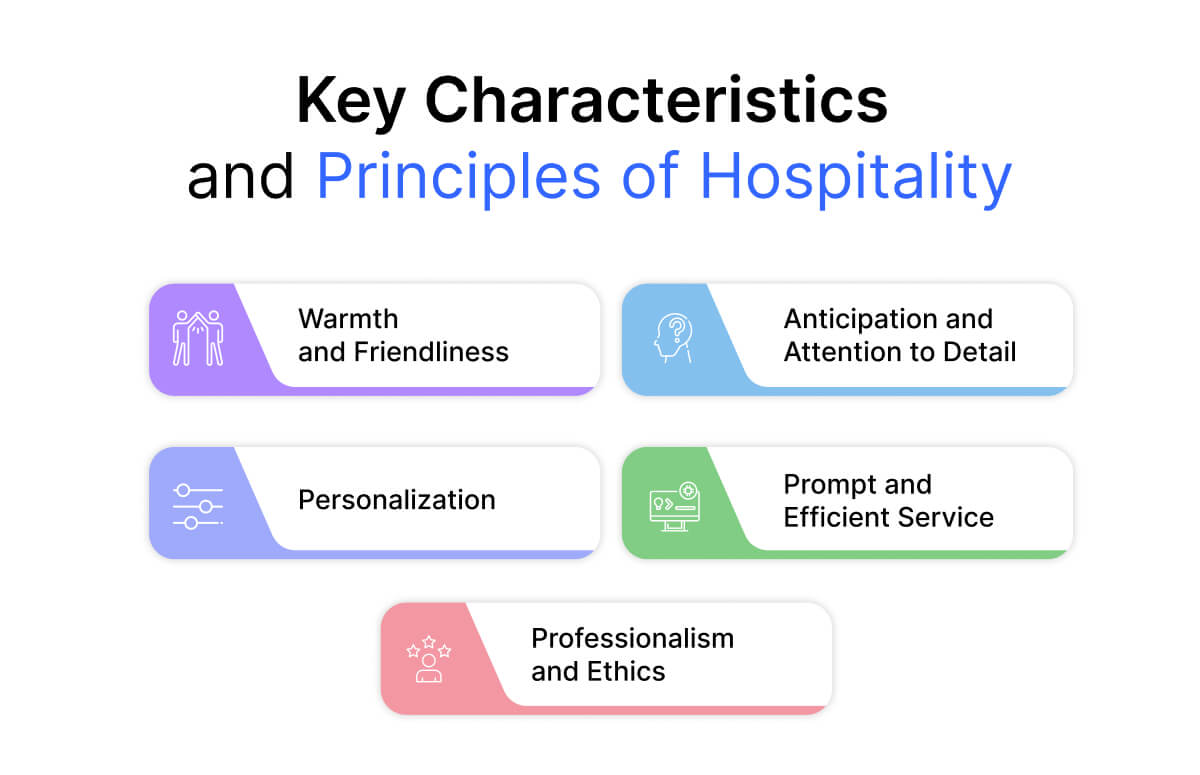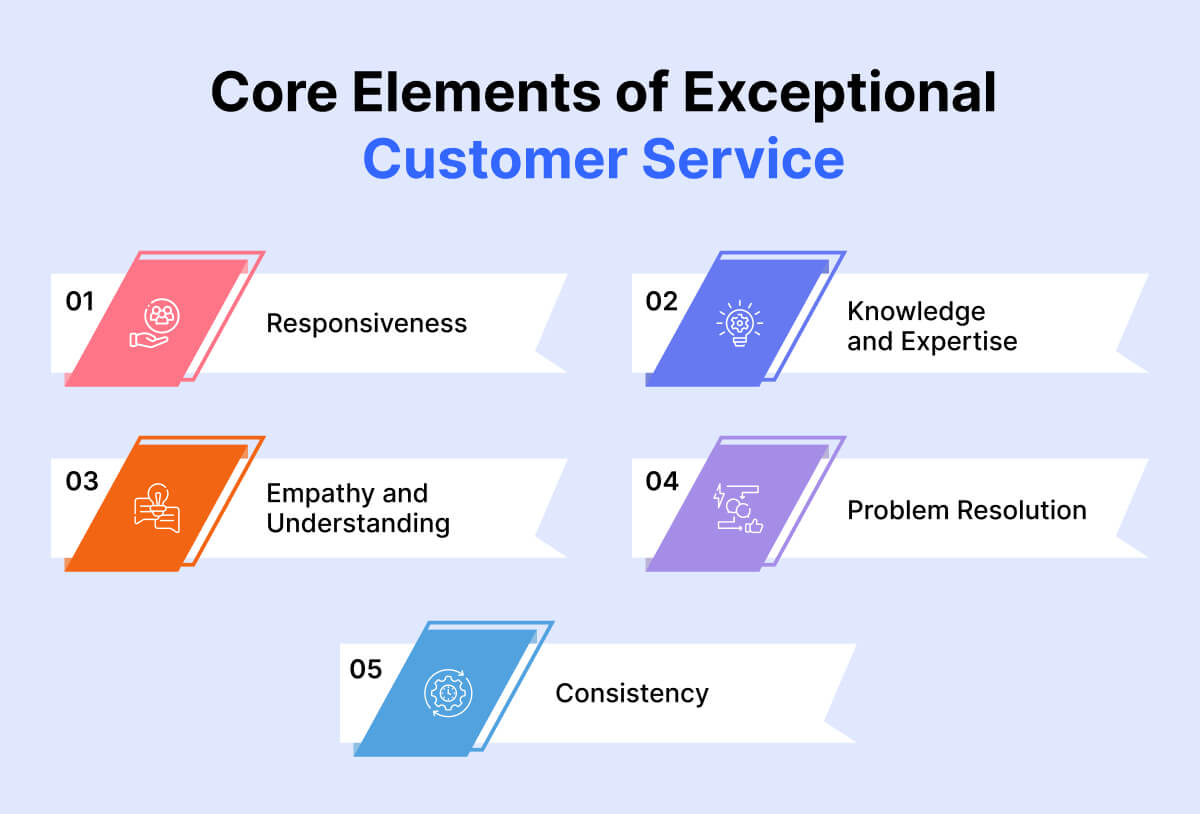Welcome to the delicate interplay of Hospitality Vs Customer Service. To ensure exceptional customer experiences, the combination of these two pillars is a must. Innovation in hospitality and customer service helps businesses stand out and create lasting impressions.
Hospitality is about creating a warm and welcoming environment that values guests. Customer service, on the other hand, focuses on exceeding customer expectations through effective communication and problem-solving. At the end of this blog, you’ll get a good understanding of hospitality and customer service. Let’s immerse ourselves in these influential fields of the business world.
Understanding Hospitality: Definition and Scope of Hospitality
Hospitality refers to the friendly and generous reception and entertainment of guests or strangers. It involves providing a welcoming environment, excellent service, and ensuring the comfort and satisfaction of individuals or groups who are being hosted.
The scope of hospitality encompasses a wide range of industries and sectors, including hotels, restaurants, tourism, event planning, resorts, and cruise ships. It involves various functions such as accommodation, food and beverage services, customer service, and event management.
Key Characteristics and Principles of Hospitality

- Warmth and Friendliness: Hospitality is characterized by a welcoming and friendly demeanor. It involves treating guests with genuine warmth, making them feel comfortable and valued.
- Anticipation and Attention to Detail: Successful hospitality involves anticipating the needs and desires of guests. This includes paying attention to even the smallest details to ensure their satisfaction and exceed their expectations.
- Personalization: A key principle of hospitality is tailoring experiences to individual guests. Understanding their preferences, needs, and expectations allows for customized interactions and services.
- Prompt and Efficient Service: Hospitality emphasizes providing timely and efficient service. Responding promptly to requests, being proactive in addressing concerns, and delivering services promptly are essential.
- Professionalism and Ethics: Hospitality professionals uphold high standards of professionalism and ethical behavior. This includes maintaining integrity, respect, and confidentiality while delivering exceptional service.
Examples of Industries that Prioritize Hospitality
- Hospitality and Tourism: This industry revolves around providing hospitality services to travelers and guests. Hotels, resorts, restaurants, airlines, cruise lines, and tourism companies prioritize creating exceptional experiences for their customers.
- Luxury Retail: High-end retailers understand the importance of hospitality in creating memorable shopping experiences. They prioritize personalized assistance, upscale store environments, and exclusive customer services to cater to their clientele.
- Healthcare and Wellness: The healthcare industry is increasingly recognizing the significance of hospitality in patient care. Hospitals, clinics, and wellness centers that prioritize hospitality focus on creating comfortable environments, offering compassionate care, and providing excellent customer service.
- Airlines: Many airlines understand the importance of hospitality to enhance the travel experience. They focus on providing excellent customer service, comfortable seating, in-flight entertainment, and quality meals.
- Event Planning: Event planners and organizers prioritize hospitality to create memorable experiences for clients and attendees. This includes managing venues, catering services, transportation, and ensuring guests feel welcomed and valued.
Understanding Customer Service: Definition and Scope of Customer Service
Customer service refers to the assistance and support provided to customers before, during, and after a purchase or interaction with a company or organization. It involves addressing customer needs, resolving issues, and ensuring a positive and satisfactory experience.
The scope of customer service extends across various industries and businesses. It includes activities such as answering inquiries, handling complaints, providing product information, processing orders, offering technical support, and building strong relationships with customers.
Core Elements of Exceptional Customer Service

- Responsiveness: Exceptional customer service involves promptly addressing customer inquiries, concerns, and requests. Responsiveness demonstrates attentiveness and a willingness to assist, building trust and satisfaction.
- Knowledge and Expertise: Providing accurate and comprehensive information to customers is crucial. Customer service representatives should possess deep knowledge of the products or services offered, enabling them to offer informed assistance and guidance.
- Empathy and Understanding: Understanding and empathizing with customers’ needs and emotions create a positive connection. Displaying empathy helps customers feel valued and heard, fostering trust and loyalty.
- Problem Resolution: Exceptional customer service entails effectively resolving customer problems or issues. It involves actively listening, taking ownership of the problem, and finding appropriate solutions to ensure customer satisfaction.
- Consistency: Consistency in customer service is vital for building trust and reliability. Delivering consistent experiences across different interactions and channels helps establish a strong reputation and customer loyalty.
Examples of Industries that Excel in Customer Service
- E-commerce: Many online retailers prioritize exceptional customer service to differentiate themselves in a highly competitive market. They provide easy-to-use websites, offer personalized recommendations, and have responsive customer support to ensure a smooth shopping experience.
- Hospitality and Food Services: Hotels, restaurants, and cafes are known for their focus on customer service. They train their staff extensively, provide attentive and personalized service, and go the extra mile to meet and exceed guest expectations.
- Technology: Leading technology companies understand the importance of customer service in building long-term relationships. They offer comprehensive support channels, actively seek customer feedback, and continuously improve their products and services based on customer needs. Examples include Apple, Microsoft, and Amazon.
- Banking and Financial Services: Banks and financial institutions understand the importance of excellent customer service. They provide personalized assistance, quick dispute resolutions, and convenient digital banking options to ensure customer satisfaction.
- Call Centers: Dedicated call centers across various industries, such as telecommunications, insurance, and utilities, specialize in providing excellent customer service. They employ trained representatives to assist customers, resolve inquiries, and ensure positive interaction.
Key Differences Between Hospitality and Customer Service Focus and Approach
|
Hospitality
|
Customer Service |
|
Hospitality is about making guests feel welcome, comfortable, and valued.
|
Customer service is about addressing the needs of customers and helping them solve any problem they have. |
|
The major focus of hospitality rests on creating a positive and enjoyable environment for guests.
|
The major focus of customer service revolves around offering assistance, information, and support to customers. |
| Hospitality can extend beyond customer interactions and may also look to influence the customer’s emotional connection with the organization. |
Customer service extends beyond resolving issues and also aims at ensuring customer satisfaction during interactions.
|
|
Hospitality a concept that is majorly associated with the hospitality industry such as hotels, restaurants, resorts etc.
|
Customer service is a fundamental component of various industries, and plays an essential role for any business that deals with customers.
|
| It starts before a customer arrives and continues throughout their stay with chief emphasis on the overall experience. |
It occurs during interactions between the customer and the business with the emphasis on meeting resolving the immediate needs promptly.
|
|
The primary skills required in hospitality include empathy, cultural sensitivity and knowledge of guests handling.
|
The primary skills in customer service include problem-solving, product knowledge and active listening.
|
Hospitality
- Hospitality focuses on creating memorable and enjoyable experiences for guests. It involves anticipating their needs, providing personalized attention, and exceeding expectations to enhance their overall experience.
- The primary goal of hospitality is to ensure guest satisfaction and loyalty. It involves going beyond basic service delivery by creating emotional connections, fostering positive interactions, and creating a welcoming atmosphere.
- Hospitality emphasizes building long-term relationships with guests. The focus is on cultivating loyalty and repeat business by consistently delivering exceptional experiences, personalized service, and building trust.
- According to a survey conducted by Deloitte, 94% of hotel guests consider personalized and attentive service as a crucial factor in their overall satisfaction with a hotel.
Customer Service
- Customer service primarily focuses on resolving customer issues, problems, or complaints. The goal is to address concerns efficiently, find appropriate solutions, and ensure customer satisfaction.
- Customer service places a strong emphasis on the delivery of products or services as per the customer’s expectations. It involves providing accurate information, efficient transactions, and prompt response times.
- Customer service often involves shorter, transactional interactions. The focus is on delivering the required service efficiently and effectively, without necessarily building long-term relationships.
- Research by American Express found that 33% of customers would consider switching companies after just one instance of poor customer service.
Customer Interaction

Hospitality
- Hospitality emphasizes personalized interactions with guests. It involves understanding individual needs, preferences, and desires to create tailored experiences and make guests feel special.
- Hospitality seeks to establish an emotional connection with guests. It involves engaging with guests on a deeper level, showing empathy, and building rapport to create a warm and welcoming environment.
- Hospitality aims to build relationships with guests over time. It involves nurturing ongoing interactions, remembering guest preferences, and providing consistent, personalized service.
- A study by J.D. Power revealed that hotel guests who have a positive staff interaction during their stay spend, on average, 27% more at the hotel than those who do not.
Customer Service
- Customer service interactions primarily revolve around resolving specific issues or addressing customer concerns. The focus is on efficiently resolving problems and providing solutions.
- Customer service interactions are often transactional in nature. They focus on completing a specific transaction, such as a purchase or a support request, rather than establishing a long-term connection.
- Customer service interactions prioritize problem-solving and providing information or assistance related to the product or service. The focus is on addressing customer queries, offering guidance, and ensuring customer satisfaction.
- According to Salesforce, 72% of customers expect customer service representatives to know their purchase history and have insights into their previous interactions across different channels.
Scope of Service

Hospitality
- Hospitality encompasses a broader range of services and experiences beyond the core product or service. It includes creating a welcoming atmosphere, offering amenities, providing personalized recommendations, and catering to guest needs.
- Hospitality extends beyond the immediate service encounter. It includes pre-arrival interactions, such as reservation assistance, and post-stay follow-up to ensure guest satisfaction and loyalty.
- Hospitality pays attention to the overall atmosphere and ambiance of the environment. It involves creating a pleasant and comfortable setting, considering factors like decor, lighting, music, and scent to enhance the guest experience.
- The Global Business Travel Association reported that 83% of business travelers believe that free Wi-Fi is the most important amenity in a hotel.
Customer Service
- Customer service primarily revolves around addressing issues or inquiries related to the core product or service. The focus is on providing support, guidance, and assistance specific to the product or service offered.
- Customer service is often limited to the immediate interaction between the customer and the service provider. It aims to meet the customer’s needs efficiently and effectively during that particular interaction.
- Customer service typically deals with the service components directly tied to the product or service. It may include installation, troubleshooting, technical support, or answering questions related to the use of the product or service.
- A survey by HubSpot found that 82% of customers expect an immediate response from companies when they have a customer service question or issue.
Emotional Engagement

Hospitality
- Hospitality aims to create emotional connections with guests by providing personalized attention, showing empathy, and understanding their individual needs and preferences.
- Hospitality strives to evoke positive emotions in guests, such as joy, comfort, and delight. The goal is to leave a lasting impression and build a strong emotional bond with the guests.
- By engaging with guests on an emotional level, hospitality builds trust and fosters loyalty. Guests are more likely to return and recommend the establishment if they feel emotionally connected and valued.
- A study conducted by Cornell University’s School of Hotel Administration showed that guests who have an emotional connection with a hotel brand have a 306% higher lifetime value compared to those who do not.
Customer Service
- Customer service interactions generally aim to resolve issues or address customer needs in a neutral and professional manner. The focus is on providing efficient solutions rather than intentionally evoking specific emotions.
- Customer service prioritizes ensuring customer satisfaction by addressing their concerns and meeting their expectations. The goal is to resolve issues promptly and effectively, leading to a positive overall experience.
- Customer service often involves dealing with customers who may be frustrated, upset, or dissatisfied. Customer service representatives are trained to handle such situations professionally and calm customers to find resolutions.
- According to Temkin Group, 63% of consumers who have a positive emotional experience with a brand are more likely to recommend that brand to others.
Proactivity vs. Reactivity

Hospitality
- Hospitality adopts a proactive approach by anticipating guest needs and preferences. This involves identifying potential issues or opportunities in advance and taking proactive measures to enhance the guest experience.
- Hospitality professionals proactively provide personalized recommendations and suggestions to guests based on their preferences, making their stay more enjoyable and memorable.
- Hospitality often incorporates surprise elements or gestures to exceed guest expectations. This proactivity creates moments of delight and enhances the overall guest experience.
- The International Journal of Hospitality Management states that hotels that proactively address negative online reviews have a 12% higher review score compared to those that do not.
Customer Service
- Customer service is primarily reactive and focused on addressing customer issues or concerns that arise. It involves identifying problems and finding appropriate solutions in response to customer feedback or inquiries.
- Customer service aims to provide quick and efficient responses to customer inquiries or complaints. The focus is on addressing issues promptly and ensuring customer satisfaction.
- Customer service teams react to customer feedback and suggestions to improve products or services. This reactive approach helps in identifying areas of improvement and implementing necessary changes.
- A survey conducted by Help Scout revealed that 80% of customers appreciate receiving proactive customer service notifications, such as updates on their orders or personalized recommendations.
Service Environment

Hospitality
- The service environment in hospitality is often designed to create a warm and welcoming atmosphere. It focuses on aesthetics, ambiance, and creating a memorable experience.
- Hospitality environments may include amenities such as comfortable seating areas, personalized decorations, and soothing background music to enhance the overall experience.
- Attention is given to details like lighting, temperature, and cleanliness to ensure guests’ comfort and satisfaction.
- According to a survey conducted by J.D. Power, 75% of hotel guests consider the cleanliness of rooms and common areas as the most important factor in their overall satisfaction with the service environment.
Customer Service
- The service environment in customer service is more focused on functionality and efficiency. It aims to provide a smooth and seamless interaction between the customer and the service provider.
- Customer service environments may include well-organized service counters, easy-to-navigate websites, and streamlined processes for quick issue resolution.
- The emphasis is on accessibility, ease of use, and minimizing customer effort to receive the necessary assistance or support.
- Research by Forrester reveals that 73% of customers say that valuing their time is the most important thing a company can do to provide good customer service in terms of the service environment.
Skillset and Training

Hospitality
- Hospitality professionals are trained in various skills, including interpersonal communication, problem-solving, and attention to detail.
- They possess knowledge of the hospitality industry, cultural sensitivity, and the ability to anticipate and fulfill guests’ needs.
- Hospitality training often includes customer service techniques, conflict resolution, and enhancing the overall guest experience.
- A study published in the International Journal of Contemporary Hospitality Management found that hotels that invest in comprehensive training programs for their staff experience a 10% increase in customer satisfaction ratings.
Customer Service
- Customer service professionals focus on effective communication, active listening, and problem-solving skills.
- They are trained in product knowledge, troubleshooting techniques, and using customer service tools and systems.
- Training in customer service often includes empathy training, conflict management, and techniques for handling difficult customers.
- A report by LinkedIn states that 94% of customers are more likely to be loyal to a company that offers excellent customer service, highlighting the significance of skillsets and training in building customer loyalty.
Impact on Customer Loyalty

Hospitality
- Exceptional hospitality has a significant impact on customer loyalty. Creating memorable experiences, personalized interactions, and exceeding expectations fosters a strong emotional connection with guests.
- Guests who receive outstanding hospitality are more likely to become loyal patrons, return for future visits, and recommend the establishment to others.
- The emotional engagement and positive memories created through hospitality contribute to long-term customer loyalty and brand advocacy.
- According to a study conducted by Deloitte, 61% of travelers are more likely to become repeat customers if they have positive experiences with the hospitality provider, indicating the strong impact of hospitality on customer loyalty.
Customer Service
- Customer service plays a crucial role in customer loyalty by resolving issues efficiently and effectively.
- Providing excellent customer service, addressing concerns promptly, and offering solutions create a positive perception and build trust.
- Satisfactory customer service experiences contribute to customer satisfaction, retention, and the potential for repeat business.
- A research study by PwC reveals that 32% of customers stop doing business with a company after just one bad customer service experience, underscoring the importance of customer service in maintaining customer loyalty.
Industry Application

Hospitality
- The hospitality industry encompasses sectors such as hotels, resorts, restaurants, airlines, cruise lines, and tourism companies. It is specifically dedicated to providing services and experiences for travelers and guests.
- The focus is on creating a welcoming and comfortable environment, delivering personalized experiences, and ensuring guest satisfaction throughout their stay or visit.
- The industry’s core objective is to offer exceptional hospitality, making it an integral part of its business model and brand identity.
- The World Travel & Tourism Council estimates that the global hospitality and tourism industry accounted for 10.4% of the global GDP in 2019, demonstrating the significant economic impact and widespread application of hospitality.
Customer Service
- Customer service is a function found in various industries across the board, including retail, healthcare, telecommunications, and technology, among others.
- Its application is not limited to a particular industry but is essential for businesses that interact directly with customers and aim to provide support and assistance.
- Customer service is viewed as a means to address customer inquiries, resolve issues, and ensure customer satisfaction, regardless of the industry in which it is employed.
- The customer service outsourcing market is projected to reach a value of $110 billion by 2024, as stated in a report by Global Industry Analysts Inc., indicating the broad industry application and demand for customer service solutions.
Key Metrics for Evaluation

Hospitality
- Occupancy Rate: This metric measures the percentage of available rooms or accommodations that are occupied within a given period. It helps assess the utilization of the property and indicates the overall demand for the hospitality services provided.
- Average Daily Rate (ADR): ADR calculates the average revenue generated per occupied room in a hotel or accommodation. It provides insights into pricing strategies and revenue management, indicating the effectiveness of rate optimization and capturing the value of the services.
- RevPAR (Revenue per Available Room): RevPAR combines occupancy rate and ADR to evaluate the overall financial performance of a hospitality establishment. It provides a comprehensive view of revenue generation and helps compare performance against industry benchmarks.
- Guest Satisfaction Score (GSS): GSS measures the level of satisfaction or happiness reported by guests during or after their stay. It is typically obtained through surveys or feedback systems. GSS helps assess the quality of service and identify areas for improvement.
- Return on Investment (ROI): ROI measures the profitability and financial returns generated from hospitality investments. It compares the cost of investment with the resulting financial gains. ROI is essential for evaluating the success and viability of hospitality projects.
Customer Service
- Customer Satisfaction Score (CSAT): CSAT is a metric that quantifies the level of customer satisfaction with the service provided. It is typically obtained through surveys or feedback forms and helps gauge overall customer happiness and loyalty.
- Net Promoter Score (NPS): NPS measures customer loyalty and likelihood to recommend a service to others. It is obtained by asking customers how likely they are to refer the company on a scale of 0 to 10.
- First Contact Resolution (FCR): FCR measures the percentage of customer inquiries or issues resolved in the first interaction with customer service. It reflects the efficiency and effectiveness of customer service in providing timely and satisfactory solutions.
- Average Response Time: This metric measures the average time taken by customer service to respond to customer inquiries or requests. It helps evaluate the speed of service and sets expectations for customers regarding the turnaround time for their queries.
- Customer Retention Rate: It quantifies the percentage of customers who continue to do business with a company over a specific period. A high retention rate indicates customer satisfaction and a strong customer service experience.
Final Words
Hospitality Vs Customer Service clearly ensures the difference between them. Instead, both of them can combinedly play pivotal roles in the grand tapestry of business success. Their harmonious blend leads to fostering loyalty and driving growth. Businesses can go to a great extent through the warmth of hospitality with the effectiveness of customer service.
This is Kawser Md Sayem, and I would like to introduce myself as a content writer. It has been five years since I began my professional writing journey. By this time, I have had the pleasure of working in unidentical industries like publishing, information technology, entertainment, and education
 Customer Service
Customer Service












